Affiliate marketing networks are the platforms that connect merchants with affiliates who promote their products and services. These networks simplify the process of finding, recruiting, and managing affiliates, allowing merchants to focus on growing their business.
Whether you’re a small business just starting or an established enterprise seeking to scale globally, this guide will help you navigate the top networks and platforms for 2025. From ShareASale’s dominance in North America to Impact’s enterprise-grade tools, discover which network suits your business needs and goals.

What is an affiliate marketing network?
An affiliate network is an intermediary platform that connects merchants (advertisers) with affiliates (publishers) who promote their products or services. It serves as a middleman, streamlining the process of recruitment, tracking, and payment between both parties. Affiliate networks simplify the affiliate marketing process for merchants by offering a marketplace where they can easily find qualified affiliates to promote their products.
Ultimately, using an affiliate network can save merchants valuable time, reduce the complexities of affiliate management, and provide access to proven affiliates, making it easier for them to grow their sales.
7 best affiliate marketing networks (2025)
In 2025, choosing the right affiliate marketing network can make a significant difference in the success of a merchant’s affiliate program. Here’s a look at the 7 best affiliate marketing networks and platforms for merchants to explore:
1. Amazon
Amazon Associate program dominates with nearly 50% market share in global affiliate activity when included in rankings. It connects a vast number of publishers and advertisers worldwide, making it the largest network by revenue and activity.
It is designed specifically for publishers and content creators who promote Amazon products in exchange for a commission on sales. It does not accept advertisers, as the program operates solely on an affiliate marketing model. Affiliates use links, banners, or widgets provided by Amazon to drive traffic to Amazon’s site, and they earn a percentage of the sales generated through those links.
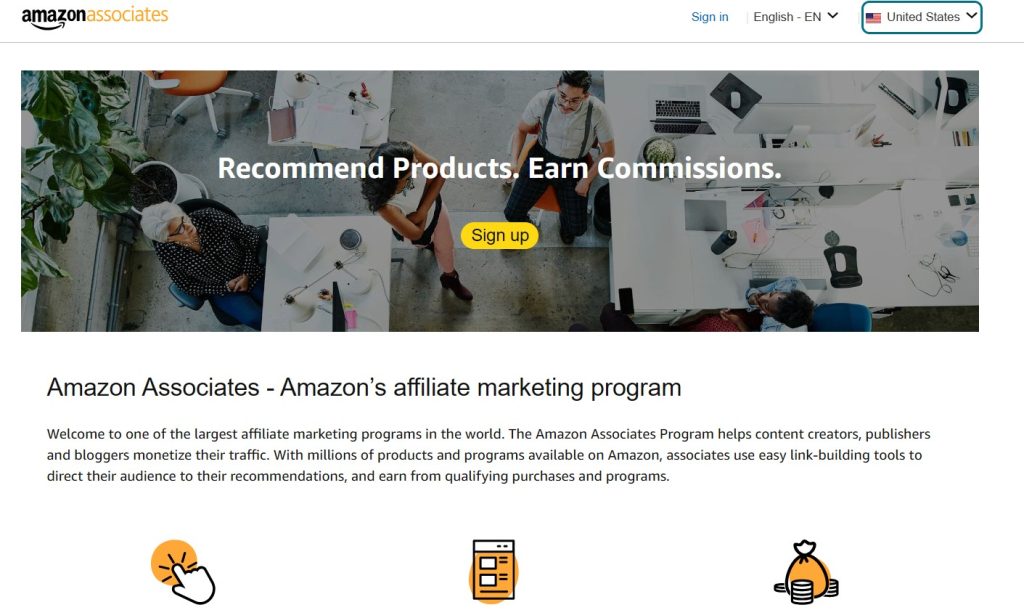
This distinction makes Amazon Associates an affiliate-only program, while Amazon Advertising and Seller Central cater to merchants and advertisers.
For merchants or advertisers looking to sell directly through Amazon, they can utilize Amazon Seller Central or Amazon Advertising. These platforms are separate from Amazon Associates and are intended for sellers who want to list and promote their products on Amazon directly.
2. ShareASale
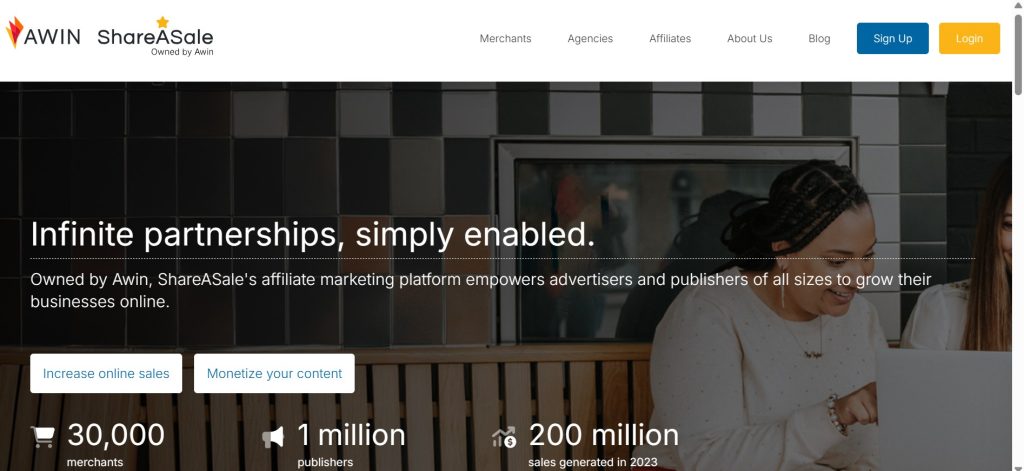
ShareASale is a leading affiliate network that is best suited for small- to mid-sized businesses. Known for its large pool of affiliates, user-friendly interface, and flexible commission structures, ShareASale allows merchants to easily manage their affiliate programs without breaking the bank. The platform offers advanced tracking and reporting tools to help merchants monitor performance and optimize their campaigns.
ShareASale provides significant scalability for growing businesses with over 3,900 active affiliate programs and affiliates worldwide. Primarily strong in North America, ShareASale also has a solid presence globally, making it an excellent option for businesses looking to expand.
Related: Sub-affiliate network
3. CJ Affiliate (formerly Commission Junction)

CJ is perfect for large-scale merchants seeking global reach. It offers advanced tracking tools, detailed reporting, and a vast affiliate network, making it ideal for merchants who need more robust affiliate marketing solutions. CJ Affiliate’s platform connects businesses with over 170,000 affiliates and operates across more than 100 countries.
This global presence, combined with the platform’s comprehensive set of features, makes it an attractive choice for merchants in regions like APAC, Australia, Japan, and Singapore. While it may require a larger budget than some alternatives, the power and depth of CJ Affiliate’s platform make it a great fit for enterprise-level businesses.
4. Impact

Impact is a premium affiliate network that caters to large merchants and enterprises. Impact offers an extensive set of features, including influencer marketing tools, fraud protection, and a robust analytics dashboard. With a higher cost than many other platforms, it is ideal for businesses that need highly customizable solutions and sophisticated tracking systems.
Impact is known for its enterprise-level capabilities, including managing high volumes of affiliates and complex commission structures. It’s perfect for large-scale businesses with international reach, offering unparalleled flexibility and detailed insights into affiliate performance.
5. ClickBank
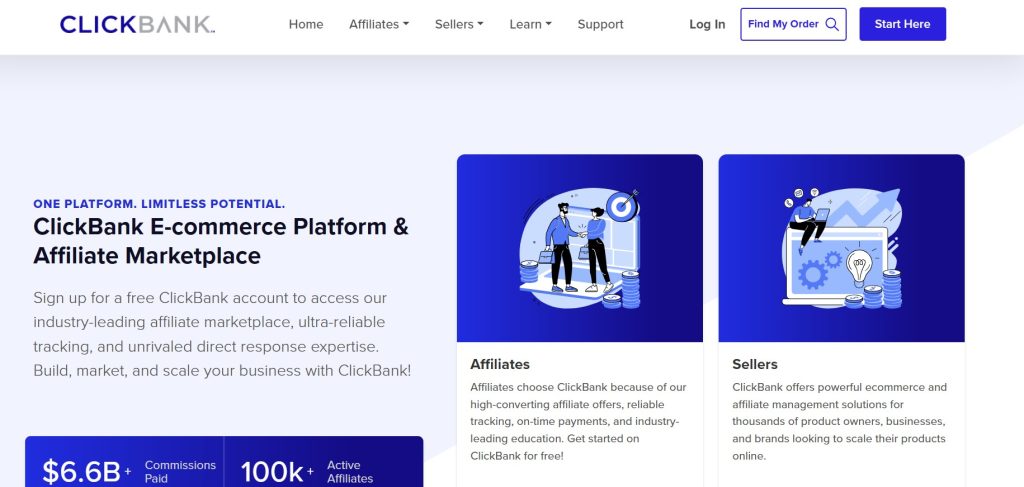
ClickBank is best known for its focus on digital products such as online courses, ebooks, and software. The platform provides a straightforward setup for merchants, allowing them to quickly get started with affiliate marketing. ClickBank has low entry barriers, which is great for businesses just entering the digital product space, but it also offers powerful tools for more established merchants.
With over 200 million customers and affiliates from around the world, ClickBank excels in the digital goods market and continues to expand globally. It’s particularly beneficial for merchants in the online education, eBook, and software industries.
6. Awin

Awin is an affiliate network that shines in Europe but also has a growing presence in other regions. With its strong affiliate database and intuitive platform, Awin supports businesses of all sizes, particularly those looking to target European audiences. Awin has a vast network of over 200,000 affiliates and offers a variety of commission models and campaign management tools.
Its focus on transparency and fair partnerships makes it a trustworthy option for businesses seeking reliable affiliate marketing solutions. While its core strength lies in Europe, Awin is expanding globally and can serve businesses looking to expand across borders.
7. BixGrow Marketplace
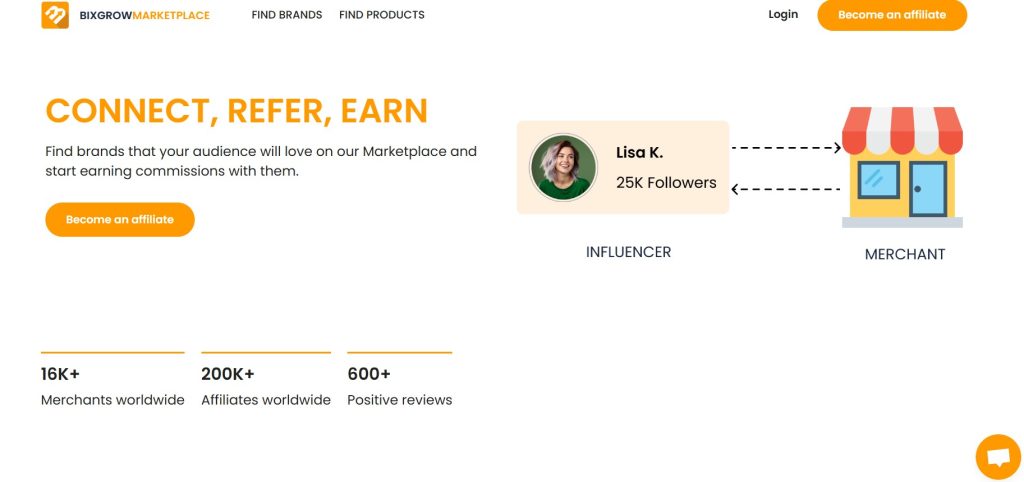
BixGrow is the best for Shopify-based stores. With seamless integration into Shopify, BixGrow helps e-commerce businesses manage and scale their affiliate programs easily. The platform provides tools for affiliate recruitment, campaign tracking, and commission management.
BixGrow is known for its low-cost entry and customizable affiliate programs, making it a great choice for growing businesses that need a simple yet effective solution for affiliate marketing. It is especially useful for Shopify merchants looking to enhance their affiliate efforts without the complexity or cost of larger networks.
8. Tapfiliate
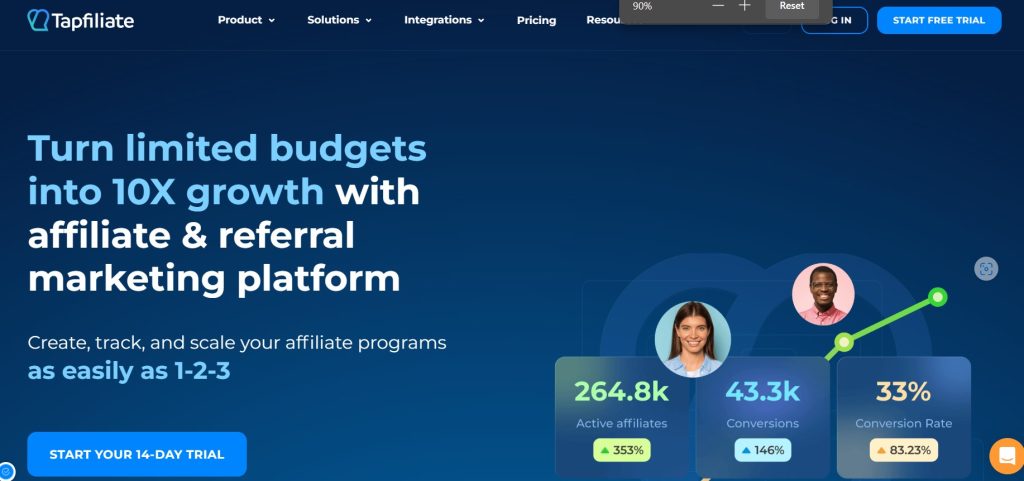
Tapfiliate is the ideal choice for SaaS companies and subscription-based businesses. The platform specializes in recurring commissions and offers integrations with major SaaS platforms, making it perfect for subscription businesses looking to scale their affiliate programs. Tapfiliate allows businesses to set up custom affiliate campaigns and track performance through easy-to-use dashboards.
With a focus on SaaS and subscription models, Tapfiliate is a great fit for businesses looking to build long-term relationships with affiliates and ensure continuous growth. Its flexibility and ease of use make it a standout option for subscription-based companies.
Affiliate marketing networks for advertisers: Comparison
This table provides a quick overview for merchants to assess which network aligns best with their business type, goals, and geographic market.
| Network | Best For | Key Strengths | Pricing | Geographic Strength |
| ShareASale | Small to mid-sized businesses | Robust tracking tools, diverse affiliate pool | Affordable setup and monthly fees | North America |
| CJ Affiliate | Large-scale merchants | Advanced analytics, global affiliate reach | Costly but enterprise-grade solutions | APAC, Australia, Japan |
| BixGrow | Shopify-based stores | Cost-effective, automation tools | Low-cost plans with free trials | Global |
| Impact | Large enterprises | Precise tracking, influencer management | Premium pricing for advanced features | Global |
| ClickBank | Digital product sellers | Easy onboarding, focused on digital niches | No setup fee, percentage of sales | Global |
| AWIN | European merchants | Transparent terms, excellent support | Entry fees plus commission sharing | Europe |
| Tapfiliate | SaaS and subscription-based businesses | Recurring commission options, integrations | Monthly subscription fees | Global |
| Platform | Number of Affiliates | Revenue Metrics (2022 Est.) | Average Revenue per Affiliate (ARPA) | Support |
| ShareASale | 300,000+ | $2.9 billion (total revenue) | ~$1,000 – $2,000 | Fast & Reliable |
| CJ Affiliate | 250,000+ | $3.4 billion | ~$1,500 – $2,500 | Fast & Professional |
| BixGrow | 200,000+ | N/A | N/A | Excellent |
| Impact | 1 million+ | $7.5 billion | ~$3,000 – $5,000 | Excellent |
| ClickBank | 200,000+ | $1.1 billion (total revenue) | ~$500 – $1,500 | Average |
| Awin | 240,000+ | $15.4 billion (total revenue) | ~$2,000 – $3,500 | Good |
| Tapfiliate | 50,000+ | N/A | ~$500 – $1,000 | Good |
Benefits of using an affiliate marketing network
Affiliate marketing networks provide numerous benefits to merchants looking to scale their affiliate programs efficiently. These platforms act as intermediaries, connecting merchants with affiliates while offering tools to manage and optimize campaigns.
- Access to a large pool of affiliates: Networks typically have a broad database of affiliates who are ready to promote products across different channels.
- Tracking and Reporting: Affiliate networks provide sophisticated tracking systems, allowing merchants to monitor the performance of their affiliate programs and optimize campaigns.
- Payment management: The network handles the payments to affiliates, ensuring timely and accurate payouts based on the commission structure.
- Reduced risk: Many affiliate networks ensure that affiliates follow guidelines and deliver quality traffic, reducing the merchant’s risk of fraud.
- Expert support and tools: Many affiliate networks provide merchants with expert support and additional tools to help manage their affiliate programs. From recruitment strategies to marketing best practices, networks like BixGrow and Tapfiliate offer helpful resources, advice, and training to ensure that merchants succeed in their affiliate marketing efforts.
In addition to these features, some affiliate networks offer advanced tools for managing partnerships, customizing commission structures, and reaching a specific audience. Some platforms even allow advertisers to access their affiliate database, enabling them to recruit affiliates directly or to explore further collaboration opportunities.
Ultimately, using an affiliate network can save merchants valuable time, reduce the complexities of affiliate management, and provide access to proven affiliates, making it easier for them to grow their sales.
Affiliate Marketing Network Fee?
The fees associated with affiliate marketing networks vary depending on the network’s scale, services, and business requirements. Merchants can expect to pay setup fees, ongoing subscription fees, commission fees, and transaction costs.
- Setup fees
Some networks charge an initial setup fee to cover the costs of integrating your program. However, many platforms, like BixGrow and Tapfiliate, may not charge this fee, making them more accessible to smaller businesses.
- Subscription fees
Most networks charge recurring monthly or annual fees for access to their tools, tracking systems, and affiliate pools. Higher-end platforms like Impact and CJ Affiliate may charge more, reflecting their advanced features and global reach.
- Commission fees
A percentage of the affiliate commissions is taken by the network, typically ranging from 10% to 30%. This fee covers administrative and operational costs like payment processing and support.
- Transaction fees
Some networks also charge transaction fees when processing payments between merchants and affiliates, though these fees are generally small.
- Premium features
Certain networks offer premium tools for an additional fee, such as advanced reporting or enhanced fraud protection. CJ Affiliate and Awin provide these features for larger enterprises that require additional capabilities.
Common Commission Models in Affiliate Marketing Networks?
Affiliate networks typically offer several commission models, which determine how affiliates are paid for driving sales or other actions. The most common models include:
- Cost Per Sale (CPS)
In the CPS model, affiliates earn a commission based on the sale of a product or service. This is one of the most widely used models, as it ties affiliate earnings directly to revenue generation.
- Cost Per Action (CPA)
The CPA model rewards affiliates for specific actions taken by users, such as filling out a form, signing up for a trial, or making a purchase. This model is commonly used for lead generation, and networks like ClickBank and Impact allow merchants to set up campaigns based on specific actions.
- Cost Per Click (CPC)
Affiliates in CPC programs earn money based on the number of clicks they drive to the merchant’s website, regardless of whether a sale occurs. This model is ideal for driving traffic to sites.
- Cost Per Mille (CPM)
CPM is based on impressions, where affiliates are paid per 1,000 impressions served. This model is often used for display advertising and can be found on networks like Tapfiliate, which allows merchants to run campaigns where affiliates earn based on how often their ads are seen.
- Hybrid
Some networks, like CJ Affiliate, offer hybrid commission structures that combine different models, such as a combination of CPS and CPA. This allows for greater flexibility depending on the campaign’s goals, whether it’s driving sales, generating leads, or boosting traffic.
How do affiliates get paid through an affiliate network?
Affiliates typically get paid through a few standard methods, including bank transfers, PayPal, checks, or direct deposit. Popular networks like ShareASale and ClickBank offer multiple options, while BixGrow has lower payout thresholds for easier access. Payment frequencies can vary from bi-weekly to monthly, with some networks offering faster payouts, like Impact. Affiliates must also meet minimum payout thresholds, which generally range from $50 to $100, depending on the network. It’s important to note that some networks may charge transaction fees, particularly for PayPal payments.
FAQs
Can I promote my affiliate program on multiple affiliate networks?
Which affiliate networks provide a searchable affiliate database that merchants can use to contact affiliates directly?
Do I need an affiliate network to start an affiliate program?
Can affiliates promote multiple merchant programs on the same network?
Conclusion
Choosing the right affiliate marketing network is a key factor in driving growth and success for your business. Whether you’re a small business looking for a cost-effective solution or a large enterprise needing robust tracking and global reach, there is a network to fit your needs.
These networks each offer unique strengths, from large affiliate databases to advanced tracking features, providing ample opportunities for merchants to grow their affiliate programs. The main benefits of using these platforms include access to professional affiliates, simplified tracking, and scalable commission structures.